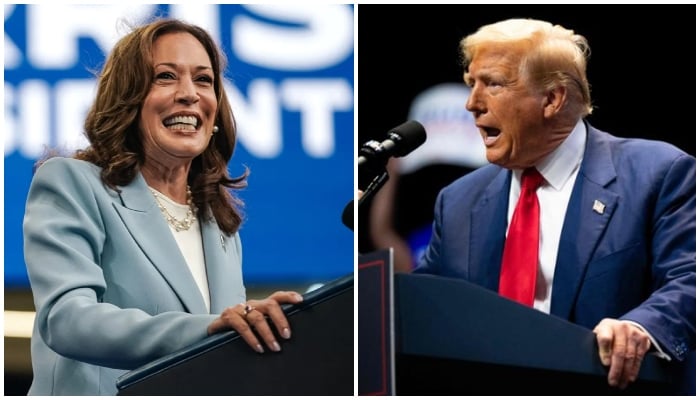US election 2024: Muslim voters in Texas uncertain about voting
Many Pakistani Muslims, in particular, blame Biden administration for recent events in Middle East
TEXAS: The United States' most populous South Central state has witnessed a limited turnout of Muslim voters, who remain unsure about whom to vote for amid the presidential elections on November 5 (tomorrow).
Muslims are being encouraged by local Muslim organisations and political figures to step out and vote.
In the previous election, the state saw the victory of two Muslim candidates who clinched a seat each in the Texas state assembly on Democratic Party tickets. They are currently on track for re-election.
Discussions with the Muslim community in Dallas, however, reveal a clear divide in opinions on the presidential elections.
This year, many Muslims are either abstaining from voting or leaning towards Republican candidate and former president Donald Trump and third-party candidates.
Many Pakistani Muslims, in particular, blame the Biden administration for recent events in the Middle East, leading to significant disapproval. Many believe Trump’s return to office could at least help avoid Muslim involvement in conflicts, a pledge he made during his campaign.
The youth, on the other hand, hope Trump will bring economic reforms that could initiate major change in the country.
It is yet to be ascertained whether the Muslims, who have so far stayed home, will participate in voting on November 5 and contribute to this change or, in protest, refrain from participating altogether.
What local community members say about US presidential polls?
Mohammad Jafar said Trump is less inclined to push for war than the current administration. He suggested that Trump’s approach might offer Muslims more relief, hinting that Trump’s initial harsh stance on minorities may have softened.
According to Jafar, continued Democratic control could increase global challenges for Muslims.
Syed Mohammad Rafi emphasises the need to support representatives who openly advocate for Muslims’ welfare. He notes that while racism is pervasive, the priority is backing candidates who genuinely support Muslims.
Amir Gilani stated that Trump’s presence could bring some improvement. He believes the current administration deserves repercussions for its treatment of Muslims and that Trump’s policies could be more effective for the US.
Imran Ahmed sees Trump’s term as more peaceful, with less emphasis on war. He feels the recent Democratic term has led to conflicts in regions like Palestine. Ahmed believes Trump’s victory could bring positive changes to both the US and its economy.
Siraj Kochenwala considers Trump better for the economy, even if it might bring some rise in racism. Formerly a Democrat supporter, he now plans to vote for the Republican party.
A Pakistani Muslim woman said she voted for a third-party candidate, believing Republicans will win Texas regardless. She feels neither Trump nor Harris would significantly impact Muslims’ lives.
Anees noted that Trump’s past may increase racism, yet feels his outreach to Muslims could be a campaign tactic. He urges Muslims to elect representatives who genuinely represent them.
Another Pakistani Muslim expressed that this election is pivotal in US history and will have lasting effects, urging Muslims to vote thoughtfully and rely on faith.
Saba Chaudhry, a Dallas resident, recounted her struggles during Trump’s policies in 2015. She said that Trump’s stance on ending wars could benefit Muslims but has doubts about his promises and believes, so Muslims need to find their own solutions.
Mohammad Adnan said racism is a constant in America but thinks Muslims should leverage their vote to signal the government on their needs.
Raeesa remarked that racism is ever-present regardless of election outcomes. Regardless of the winner, she hoped, Muslim voices are heard.
Sultan Baig had mixed feelings about Trump but is hopeful for a candidate who benefits Muslims. He noted that racism varies across states, being more evident in places like Texas.
Farooq Khan from Irving suggested voting for one of the two major parties to ensure Muslim representation. He reflected on the evolving narrative post-2001 and believes Trump’s outreach could create a positive impression.
Rahim Siraj says both candidates are controversial, but he intends to vote based on the best economic policies. He foresees Trump taking the lead again and believes stability will return regardless of the outcome.
-
Security forces gun down 30 terrorists in multiple IBOs in KP: ISPR
-
MQM-P calls for new province in Sindh
-
US report validates Pakistan military edge over India: PM
-
Banned TTP poses serious threat to Pakistan security: UNSC panel
-
CM Afridi clarifies remarks on by-poll after ECP requests army deployment
-
Dubai sees 3.2m Pakistani passengers in 2025 as airport sets new milestone
-
Security forces kill 23 Indian proxy terrorists in KP's Kurram
-
Pakistan to construct island to boost oil exploration: report












